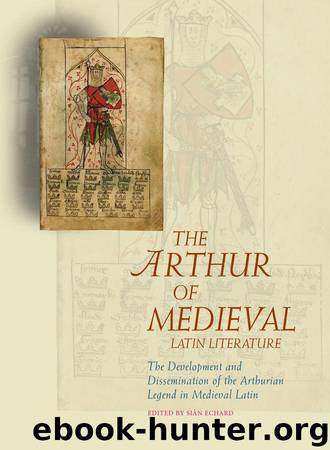The Arthur of Medieval Latin Literature: The Development and Dissemination of the Arthurian Legend in Medieval Latin (Arthurian Literature in the Middle Ages) by Siân Echard

Author:Siân Echard
Language: eng
Format: azw3
Publisher: University of Wales Press
Published: 2011-03-14T16:00:00+00:00
In other words, the reason why no historian reports Arthur’s death is that no one was present to witness it when it happened. The ambiguity surrounding his death is thus a historical accident.
A second influential and widely disseminated later chronicle to transmit HRB is Ranulph Higden’s Polychronicon, translated into English by John Trevisa in 1387.44 Higden (d.1364) was a Benedictine monk at St Werburgh’s abbey in Chester. His history starts with Creation and ends with Higden’s present. For the period of Arthur’s rule, his main authorities were Geoffrey of Monmouth, Henry of Huntingdon, William of Malmesbury and Martin of Troppau’s Chronicle of the Popes. From these, Ranulph, too, gathered that Geoffrey got the pope’s name wrong. As he points out, the correct name is Justinian, the fifth pope after Leo. He also points out that, given the pre-eminence attributed to Arthur by Geoffrey, it is suspicious that no other historians praise Arthur. Trevisa, Ranulph’s translator, has no time for such quibbles. It is true, he concedes, that some of Geoffrey’s names are unexpected, but rulers do and did have multiple names and these often vary from place to place: ‘ofte an officer, kyng, oþer emperour haþ many dyuers names, and is diverselyche i-nempned in many dyvers londes’.45 Nor should we expect exact agreement between different authorities when even the Gospel lives of Jesus differ amongst each other.
Trevisa’s defensiveness might give the misleading impression that Hidgen was attacking HRB, but in actual fact Trevisa’s arguments owe something to Hidgen’s own defensive manoeuvring. Admittedly, Higden points out that chroniclers from other nations do not mention any Arthur, despite his many foreign conquests, but for this oddity he himself offers a possible explanation:
But perhaps it is the habit of any nation to extol one of their own with excessive praises. This often happens, as Josephus says, because of the beauty of the history, or for the sake of the readers’ pleasure, or to exalt one’s own bloodline.46
Download
This site does not store any files on its server. We only index and link to content provided by other sites. Please contact the content providers to delete copyright contents if any and email us, we'll remove relevant links or contents immediately.
| Ancient & Classical | Arthurian Romance |
| Beat Generation | Feminist |
| Gothic & Romantic | LGBT |
| Medieval | Modern |
| Modernism | Postmodernism |
| Renaissance | Shakespeare |
| Surrealism | Victorian |
4 3 2 1: A Novel by Paul Auster(12377)
The handmaid's tale by Margaret Atwood(7757)
Giovanni's Room by James Baldwin(7330)
Asking the Right Questions: A Guide to Critical Thinking by M. Neil Browne & Stuart M. Keeley(5762)
Big Magic: Creative Living Beyond Fear by Elizabeth Gilbert(5757)
Ego Is the Enemy by Ryan Holiday(5417)
The Body: A Guide for Occupants by Bill Bryson(5082)
On Writing A Memoir of the Craft by Stephen King(4936)
Ken Follett - World without end by Ken Follett(4723)
Adulting by Kelly Williams Brown(4567)
Bluets by Maggie Nelson(4548)
Eat That Frog! by Brian Tracy(4526)
Guilty Pleasures by Laurell K Hamilton(4440)
The Poetry of Pablo Neruda by Pablo Neruda(4098)
Alive: The Story of the Andes Survivors by Piers Paul Read(4023)
White Noise - A Novel by Don DeLillo(4006)
Fingerprints of the Gods by Graham Hancock(3996)
The Book of Joy by Dalai Lama(3976)
The Bookshop by Penelope Fitzgerald(3844)
